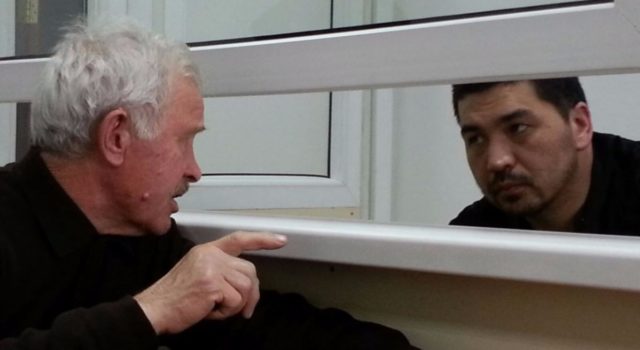 Russia is rapidly losing its traditional leverage in Kazakhstan. Not only is demographic change swiftly reducing the share of ethnic Russians in the population, but the government in Astana is promoting the Latinization of the Kazakh alphabet (see EDM, April 25) and a new and more radical generation of Kazakh nationalists is coming to the fore.
Russia is rapidly losing its traditional leverage in Kazakhstan. Not only is demographic change swiftly reducing the share of ethnic Russians in the population, but the government in Astana is promoting the Latinization of the Kazakh alphabet (see EDM, April 25) and a new and more radical generation of Kazakh nationalists is coming to the fore.
On the one hand, these developments are reducing Moscow’s ability to influence Kazakhstan; and on the other, they are dramatically changing the role Kazakhstan is going to play not only vis-à-vis Russia but also with regard to other Central Asian countries and the broader world.
Some pro-Moscow Kazakhs, like Yermek Taychibekov, who was recently released from prison where he served a sentence for advocating that Kazakhstan and Russia unite, argue their country is going the way of Ukraine: by mobilizing its ethnic majority against all things Russians, it is implicitly inviting Moscow to intervene as it has in the Ukrainian case (Svpressa.ru, October 22). Such claims are certainly overblown, and the possibility that Russia could intervene in Kazakhstan is increasingly unlikely given the demographic changes in that Central Asian country. But the vehemence with which these views are expressed does highlight just how fundamental the changes there are and how fateful they are likely to prove.
Joseph Stalin drew the borders of Kazakhstan before World War II, to ensure that that republic would be dominated by ethnic Russians and that any possibility of a combination of Central Asian republics against Moscow would be excluded. Kazakhstan could not unite with the others lest it risk the loss of the ethnic-Russian northern third of the country. And Kyrgyzstan, Tajikistan and Turkmenistan could not unite with the far larger Uzbekistan unless Kazakhstan joined the mix (see EDM, October 17). The Russian share of the population was boosted not only by World War II but also by Nikita Khrushchev’s Virgin Lands development program in the late 1950s. And until the late 1980s, ethnic Russians formed a plurality of Kazakhstan’s population, while ethnic Kazakhs formed a minority in their own republic.
But even in the last decades of the Soviet Union, two factors were already working to reduce the Russian share of the population: outmigration of ethnic Russians, a higher death rate among those remaining in Kazakhstan, and far higher birthrates and far lower death rates among the much younger ethnic Kazakhs, according to Aleksandr Alekseyenko, a demographic historian at East Kazakhstan State University. As a result, he says, the Kazakhs gained plurality status in the late 1980s, majority status in the 1990s, and will form 80 percent or more of Kazakhstan’s population in a decade or so (Central Asia Monitor, October 20).
In the 1990s, Alekseyenko says, “the greatest influence on the change of the ethno-demographic composition of the population of the republic was external migration”—the flight of ethnic Russians and other Europeans and the repatriation of ethnic Kazakhs. Now, however, these factors are less important than the relative balance between birth and death rates among the various groups. Among ethnic Russians, who are an older population, birth rates are quite low and death rates quite high; but among Kazakhs, who are much younger, just the reverse is true. As a result, the shift from the former to the latter is taking place quickly and will continue to do so, even though birthrates among the urbanizing ethnic Kazakhs are likely to fall over time.
The Kazakhstani government has responded by taking a nationalist line that has met almost all the demands of the “romantic” form of nationalism that dominated the republic in the years just before and just after the achievement of independence in 1991. These new policies now include a real path to the Latinization of the Kazakh alphabet and the closer integration with the Turkic world this promises, according to Kazakh commentator Arman Kudabay. But now, he suggests, these “romantics” have been succeeded by a variety of groups, none of which is yet dominant but out of which is likely to emerge a new and more radical form of nationalism that may end by challenging the Kazakhstani state itself (Central Asia Monitor, October 19).
These nationalists, mostly unorganized, have their roots in the same sense of economic and cultural dispossession that explains the rise of the populist right in Russia, Europe and the United States, the commentator continues. They are angry about what has happened to them, but so far at least, he suggests, they have not decided to blame just one category. For them, Kudabay suggests, “it really is not important who has ‘offended’ them: Hindu or Arab, Chinese or Almaty resident, ‘sovok’ or ‘vatnik,’ ‘their own’ or ‘aliens.’ ” What matters is that they are angry about what has happened and want to strike out.
The “romantic” nationalists of the past, he continues, no longer have their sympathies: “ ‘We do not believe you!’ ” is what the new nationalists often say. “ ‘You have also sold us out.’ ” As a result, Kudabay argues, the milder Kazakh nationalism of the 1990s is now over; and the country “stands on the brink of serious changes.” It remains to be seen whether these emerging new nationalists might eventually become hijacked by radical Islamism or become “tragic” for some other reason.
The Jamestown Foundation, October 26, 2017




